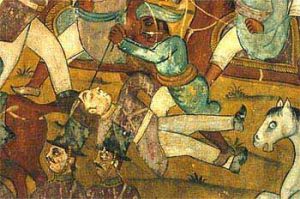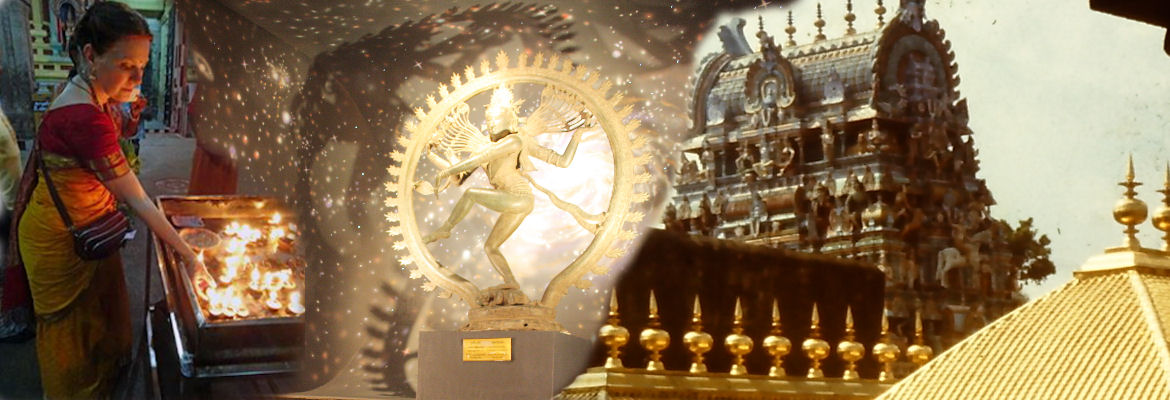
The third part in the series of Jacob Haafner’s rendering of the battle at Perambani, also know as Pollilur. Haafner had a deep resentment of the British about how they treated the Indian people. And thought of Tippoo Sultan as a kind of hero for the Indian independence. With enthusiasm he describes the British defeat. And regrest it that Tippoo and his father Hyder Ali Khan did not push for Madras at the time. Haafner thinks this would have brought an early end to British domination in India.
As fast as the Avoutrou (Mountain Eagle) pierces the air on his outspread wings, his riders again pour forward from all sides, with felled spears and terrible shouting – the earth trembles under the hoofs of their roaring horses. Just as quick the leaders of the British troops search to restore their ranks again. Their hasty effort increases the confusion; with loud cries and fearful clamor, they run along the confused lines of their warriors, encouraging them to receive the approaching enemy with the raised daggers of their guns, and to turn them back.
Like a hurricane interrupted in its devastating speed by a thick forest, attempts to find a way through with redoubled howling and rage until it penetrates at last, and shoots over the fallen trees into the echoing valley – so terrible are the repeated shocks of Massourian riders, onto the formidable square – wildly cheering, they finally break through, tearing it from all sides. The infantry and other troops streamed after them with gruesome shouting; while the English, surrounded on all sides and affected, their heads spinning by conflicting orders, unsure whom to obey – were desperately running here and there. Their ranks almost dissolved, all order and discipline has an end.
Ten thousand blades now lighten at once in the raised fists of Massours. Spears without count lift up their glittering tips. Like waves of the sea, with their foaming backs – thus the glimmering swords rise and fall on the heads of the British. It is not a regular fight of organized rows; it is a shrill slaughter, a murderous bustle. The snorting of the horses, the tumult and the shouting of the combatants, the screams of rage, the groans of the wounded – and the howling of wild despair, resounds on all sides. Dust and sand, mixed with the choking exhalation of men and horses, and the vapor of the smoking blood, rises up and surrounds the combatant with a thick cloud.
Some among the English plunge desperately in the outstretched spears, others look anxiously for a way to escape the hounding sword, and to save themselves from the terrible throng; but many, namely the Scottish and Bengal troops, unite and use their arms to die not unavenged. Baily is at their head, he urges them to valor – the risk increases his courage.
Like a wild boar, in the dark forests of Lonka (* Lonka, this is the old name of the island of Ceylon), attacked by fierce dogs, and the sharp arrows of Vadahs († wild forest inhabitants of Ceylon), neither fears, nor seeks to evade them. Sparks jump from his eyes, his brushes rise up along his curved back, sharpening his tusks on the gnarled trunk of a tree, and, casting himself furiously among his pursuers – cutting down everything that come before him, and persistently fights – until he, covered with wounds, crashes down – thus Baily fought and defended himself with his Europeans still a long time, and made many a foe bite the dust.
But gradually their small troupe shrinks together; from all sides they are struck down, and almost the Massourers have no enemies left to fight any more; everything is destroyed, everything is slain! the battlefield is covered with dead and dying. Triple the corpses are piled on top of one another, horses stumble over them, deeply they tread into the foaming blood – their bellies are painted with the splashing blood of the slain.
Baily with some few, escaped death (* It was with great trouble that the French Gunners, who were in Tippoo’s detachment, saved him with some of his officers and soldiers), and became prisoners of war.
As far Munro is concerned, who was located about seven English miles from the place where this battle took place; as soon as he had heard from some escaped Sepoys of Baily’s fate or he withdrew with the greatest haste to Chenglepet, six-and-twenty English miles from there: leaving his luggage – even his guns in the run; which all fell into the hands of the enemy. The loss of the English is counted, in that battle, at about 2100 Europeans and 8000 Sepoys, which were all sabered down.
Thus ended this memorable battle; the first, which was fought between the two warring parties. It would have been finished with the English on the coast, had Hyder Aly then, with the bulk of his army, gone to Madras, while Tippoo meanwhile, with a reinforcement, had surrounded the troops of Munro in Chinglepet. Madras, in the state it was in then, would surely have fallen before it could have received help from Bengal – and what boon would it have been for the Indian people! What a blessing, what a glory for the Nabab – having driven the white tyrants from the coast, and having destroyed one of their strongest robber nests.

Leave a Reply
You must be logged in to post a comment.